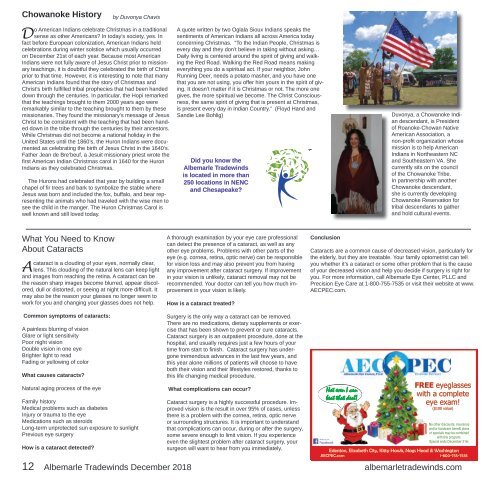Tradewinds December 2018 Web Final
December 2018 Edition of the Albemarle Tradewinds Now Online. Merry Christmas.
December 2018 Edition of the Albemarle Tradewinds Now Online. Merry Christmas.
Create successful ePaper yourself
Turn your PDF publications into a flip-book with our unique Google optimized e-Paper software.
Chowanoke History<br />
by Duvonya Chavis<br />
Do American Indians celebrate Christmas in a traditional<br />
sense as other Americans? In today’s society, yes. In<br />
fact before European colonization, American Indians held<br />
celebrations during winter solstice which usually occurred<br />
on <strong>December</strong> 21st of each year. Because most American<br />
Indians were not fully aware of Jesus Christ prior to missionary<br />
teachings, it is doubtful they celebrated the birth of Christ<br />
prior to that time. However, it is interesting to note that many<br />
American Indians found that the story of Christmas and<br />
Christ’s birth fulfilled tribal prophecies that had been handed<br />
down through the centuries. In particular, the Hopi remarked<br />
that the teachings brought to them 2000 years ago were<br />
remarkably similar to the teaching brought to them by these<br />
missionaries. They found the missionary’s message of Jesus<br />
Christ to be consistent with the teaching that had been handed<br />
down in the tribe through the centuries by their ancestors.<br />
While Christmas did not become a national holiday in the<br />
United States until the 1860’s, the Huron Indians were documented<br />
as celebrating the birth of Jesus Christ in the 1640’s.<br />
Father Jean de Bre’beuf, a Jesuit missionary priest wrote the<br />
first American Indian Christmas carol in 1640 for the Huron<br />
Indians as they celebrated Christmas.<br />
The Hurons had celebrated that year by building a small<br />
chapel of fir trees and bark to symbolize the stable where<br />
Jesus was born and included the fox, buffalo, and bear representing<br />
the animals who had traveled with the wise men to<br />
see the child in the manger. The Huron Christmas Carol is<br />
well known and still loved today.<br />
A quote written by two Oglala Sioux Indians speaks the<br />
sentiments of American Indians all across America today<br />
concerning Christmas. “To the Indian People, Christmas is<br />
every day and they don’t believe in taking without asking…<br />
Daily living is centered around the spirit of giving and walking<br />
the Red Road. Walking the Red Road means making<br />
everything you do a spiritual act. If your neighbor, John<br />
Running Deer, needs a potato masher, and you have one<br />
that you are not using, you offer him yours in the spirit of giving.<br />
It doesn’t matter if it is Christmas or not. The more one<br />
gives, the more spiritual we become. The Christ Consciousness,<br />
the same spirit of giving that is present at Christmas,<br />
is present every day in Indian Country.” (Floyd Hand and<br />
Sandie Lee Bohlig)<br />
Did you know the<br />
Albemarle <strong>Tradewinds</strong><br />
is located in more than<br />
250 locations in NENC<br />
and Chesapeake?<br />
Duvonya, a Chowanoke Indian<br />
descendant, is President<br />
of Roanoke-Chowan Native<br />
American Association, a<br />
non-profit organization whose<br />
mission is to help American<br />
Indians in Northeastern NC<br />
and Southeastern VA. She<br />
currently sits on the council<br />
of the Chowanoke Tribe.<br />
In partnership with another<br />
Chowanoke descendant,<br />
she is currently developing<br />
Chowanoke Reservation for<br />
tribal descendants to gather<br />
and hold cultural events.<br />
What You Need to Know<br />
About Cataracts<br />
cataract is a clouding of your eyes, normally clear,<br />
A lens. This clouding of the natural lens can keep light<br />
and images from reaching the retina. A cataract can be<br />
the reason sharp images become blurred, appear discolored,<br />
dull or distorted, or seeing at night more difficult. It<br />
may also be the reason your glasses no longer seem to<br />
work for you and changing your glasses does not help.<br />
A thorough examination by your eye care professional<br />
can detect the presence of a cataract, as well as any<br />
other eye problems. Problems with other parts of the<br />
eye (e.g. cornea, retina, optic nerve) can be responsible<br />
for vision loss and may also prevent you from having<br />
any improvement after cataract surgery. If improvement<br />
in your vision is unlikely, cataract removal may not be<br />
recommended. Your doctor can tell you how much improvement<br />
in your vision is likely.<br />
How is a cataract treated?<br />
Conclusion<br />
Cataracts are a common cause of decreased vision, particularly for<br />
the elderly, but they are treatable. Your family optometrist can tell<br />
you whether it’s a cataract or some other problem that is the cause<br />
of your decreased vision and help you decide if surgery is right for<br />
you. For more information, call Albemarle Eye Center, PLLC and<br />
Precision Eye Care at 1-800-755-7535 or visit their website at www.<br />
AECPEC.com.<br />
Common symptoms of cataracts:<br />
A painless blurring of vision<br />
Glare or light sensitivity<br />
Poor night vision<br />
Double vision in one eye<br />
Brighter light to read<br />
Fading or yellowing of color<br />
What causes cataracts?<br />
Natural aging process of the eye<br />
Family history<br />
Medical problems such as diabetes<br />
Injury or trauma to the eye<br />
Medications such as steroids<br />
Long-term unprotected sun exposure to sunlight<br />
Previous eye surgery<br />
How is a cataract detected?<br />
Surgery is the only way a cataract can be removed.<br />
There are no medications, dietary supplements or exercise<br />
that has been shown to prevent or cure cataracts.<br />
Cataract surgery is an outpatient procedure, done at the<br />
hospital, and usually requires just a few hours of your<br />
time from start to finish. Cataract surgery has undergone<br />
tremendous advances in the last few years, and<br />
this year alone millions of patients will choose to have<br />
both their vision and their lifestyles restored, thanks to<br />
this life changing medical procedure.<br />
What complications can occur?<br />
Cataract surgery is a highly successful procedure. Improved<br />
vision is the result in over 95% of cases, unless<br />
there is a problem with the cornea, retina, optic nerve<br />
or surrounding structures. It is important to understand<br />
that complications can occur, during or after the surgery,<br />
some severe enough to limit vision. If you experience<br />
even the slightest problem after cataract surgery, your<br />
surgeon will want to hear from you immediately.<br />
Not even I can<br />
beat that deal!<br />
FREE eyeglasses<br />
with a complete<br />
eye exam!<br />
($100 value)<br />
No other discounts, insurance<br />
and/or hardware benefit plans<br />
or specials may be combined<br />
with this program.<br />
Special ends <strong>December</strong> 31st.<br />
Edenton, Elizabeth City, Kitty Hawk, Nags Head & Washington<br />
AECPEC.com 1-800-755-7535<br />
12 Albemarle <strong>Tradewinds</strong> <strong>December</strong> <strong>2018</strong> albemarletradewinds.com

















